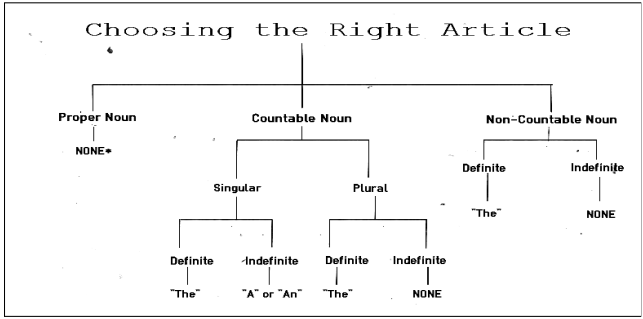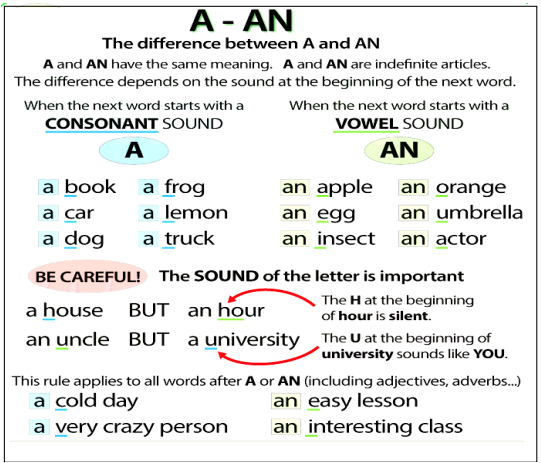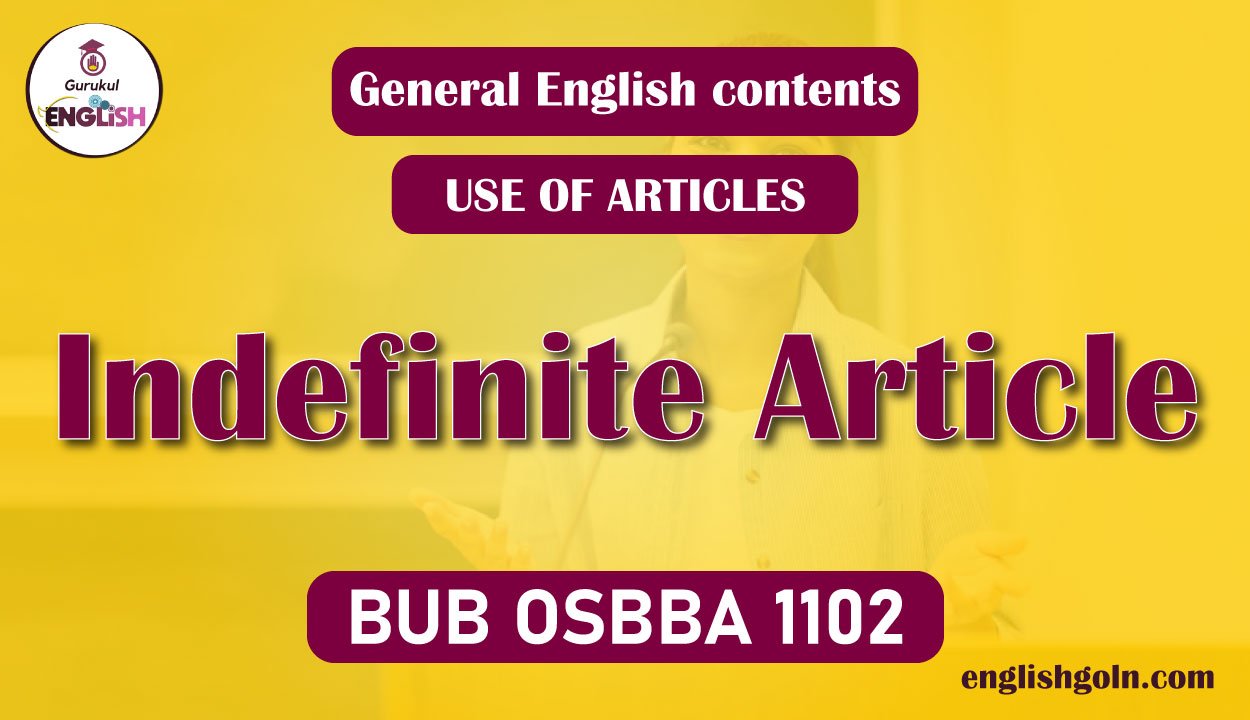Today is our topic of discussion – Indefinite Article
Indefinite Article
Indefinite Article
‘A’ and ‘an’ are indefinite articles as they generalize the noun rather than specifying it. Nouns which are uncountable do not take indefinite articles. Only countable nouns take indefinite articles.
*An’ is used before vowel sounds. ‘A’ is used before consonant sounds.
The following nouns are uncountable:

Compare these countable and uncountable nouns:
Countable
- I’m looking for a job.
- What a beautiful view!
- It’s a nice day today.
- We had a lot of bags and cases.
- These chairs are mine:
- That’s a good suggestion.
Uncountable
- I’m looking for work. (not a work)
- What beautiful scenery!
- It’s nice weather today.
- We had lot of baggage/luggage.
- This furniture is mine.
- That’s good advice.

When two nouns are together like the following, sometimes we write them as one word and sometimes as two separate words.
For example:
a headache, a toothpaste, a weekend, a car park, a road sign
Note the difference between:
A sugar bowl (perhaps empty) and a bowl of sugar (= a bowl with sugar in it)
A shopping bag (perhaps empty) and a bag of shopping (= a bag full of shopping)
When we use noun + noun, the first noun is like an adjective. It is normally singular, but the meaning is often plural.
For example:
a bookshop is a shop where you can buy books, an apple tree that has apples.
In the same way we say:
A three-hour journey (=a journey that takes three hours)
A ten-pound note (not pounds)
A four-week course (not weeks)
Two 14-year-old girls (not years)
A six-page letter (not pages)
Position of the indefinite article
i) alan is an article. So it belongs to the class of determiners. As a determiner, its position is before the adjective.
Example:
A good book
An intelligent girl
ii) alan is placed after predetermines like many/much/rather/quite/what:
1.What a man he is! (not, a what man)
2. Many a man was injured. (not, a many man)
3. He gave such a talk that everybody fell asleep. (not, a such talk)
4. She is quite a beauty. (not, a quite beauty)
iii) alan is placed after adjectives. They are personified by as/so/too/how/quite:
5. How fine a place it is!
6. It is too absurd as an answer.
Usage on the basis of sound
The choice between a/an is determined by the initial sound of the word following it. If the word begins with a consonant sound, use ‘a’; if the word begins with a vowel sound, use ‘an’.
i) a+consonant sound
‘a’ is used before a word beginning with a consonant sound.
Example:
A book, a cat, a dog, a fan, a university, a European
Note:
a) Words beginning with ‘u/eu’ have an initial ‘y’ sound, so they take ‘a’.
For example:
a unit, a utensil, a union, a utopia, a eunuch, a ewe, a eulogy, a euphemism
b) ‘o’ pronounced like ‘w’ is a consonant sound and takes ‘a’.
For example:
a one-eyed man, a one-act play
ii) an + vowel sound
‘an’ is used before a word beginning with a vowel sound.
For example:
An apple, an egg, an inkpot, an hour, an honor, an heir
Words beginning with a mute ‘h’ take ‘an’, not ‘a’:
For example:
Heir, honest, honor, hour, honorary, honorarium
1. He is an honest man.
2. We had an hour’s rest.
3. It is an honor to me.
Note:
4. This is an honorary post.
a+ hotel, historical, habitual, humble
1. That is a hotel.
2. This is a historical novel.
3. He is a habitual drunkard.
4. This is a humble beginning.
iv) an+acronyms/abbreviations
an is used before acronyms/abbreviations beginning with f, h, l, m, n, r, s, x because each of these consonants has an initial vowel sound e/a:
f(ef), h (eich), I (el), m (em), n (en), r (aar), s (es), x (eks)
For example:
1. He is an FBI agent.
2. This is an HMT watch.
3. He is an LLB.
4. He is an MP.
5. He is an NCC officer.
6. He has sent SOS.
7. This in an X-ray telescope.
Note:
a) MS is an abbreviation for manuscript. The abbreviated form is usually pronounced manuscript, not ’em-es’, so it takes a.
For example:
This is an MS (em-es) of my new book. This is a MS (manuscript) of my new book. Not an
b) Xmas is an abbreviation for Christmas but it is usually pronounced as ‘Christmas’, not ‘Ex-mas’, so it takes a. it pronounced ex-mas’, the article should be an:
For example:
a Xmas (Christmas) card. (not, an) This is an Xmas (Ex-mas) card.
v) a/an + adverb/adjective + noun
The choice of alan does not always depend on the initial sound of what follows it immediately. It can be an adjective or adverb placed before the noun:
For example:
An honest man, an extremely difficult problem, a great artist, a very arousing story
vi) an + number
‘an’ is used before a number beginning with a vowel sound.
For example:
This is an 18-player team.
He is an 80-year old man.
But: This is a 5-year old child.

Usage on the basis of structure
i) alan + singular countable
a/an is used before a singular countable noun that is mentioned for the first time and does not refer to a particular person or a thing:
1. What’s this? This is a bus.
2. What’s that? That is an orange. (the is not possible here)
Note:
a) A singular indefinite countable noun cannot be used without ‘a/an’.
We don’t say: This is pen. That is elephant.
b) uncountable without ‘a/an’
An uncountable singular noun does not take ‘a/an”:
This is water/sugar. (not, a water/sugar)
This is ink/oil (not, an ink/oil)
ii) alan + noun (as a class)
‘a/an’ is used before a singular countable noun when it represents a class, when one means all/every.
For example:
A triangle has got three sides. (all triangles)
A horse is animal. (all horses)
iii) alan + noun (profession etc)
‘a/an’ is used before a singular noun denoting profession, occupation, post, rank, caste, community, religion, nationality or political loyalty.
For example:
1. He is a teacher.
2. She is a Christian.
3. He is a German.
4. She is a socialist.
iv) alan+noun (degree/title)
‘a/an’ is used before a noun denoting a degree/title.
For example:
He is a graduate.
She is an M.Sc. (not, She is B.A. or He is Ph.D.)
alan + noun (rate)
‘a/an’ is used before a noun expressing the rate.
For example:
Fish sells at fifty taka a kilo.
She can type forty words a minute.
Bananas sell at ten taka a dozen.
He goes home once a week.
vi) alan + verb-noun (verb used as a noun), alan is used before a verb used as a noun:
1. He has gone for a walk.
2. Have a look at this book.
3. He gave a talk on grammar.
4. I have a bath at 9 o’clock.
5. This razor gives me a good shave.
We don’t say:
She is going for swim/ride now.
He took her out for drive.
vii) An uncountable noun takes ‘alan’ when it is treated as a countable noun, that is used in a particular sense.
For example:
It is a cold day. (Countable)
It is cold in the winters. (Uncountable)
Drink a glass of milk at night. (Countable)
The milk is warm. (Uncountable)

